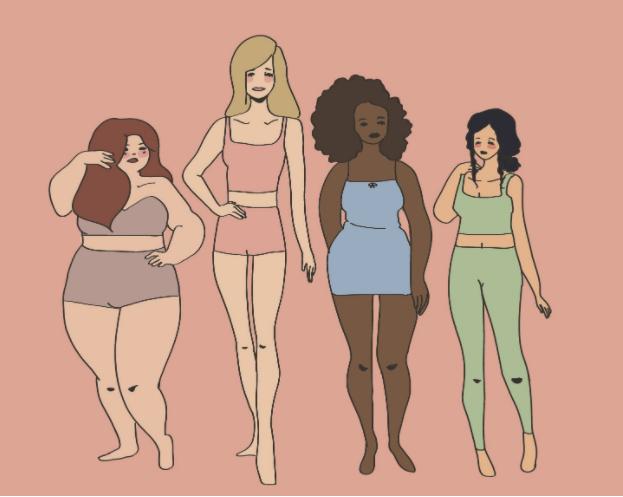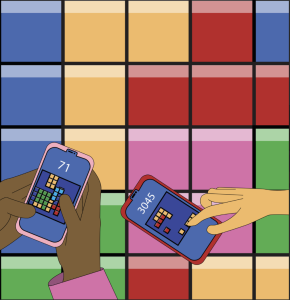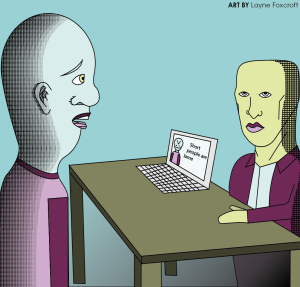Body shaming among teenagers
It’s the 21st century and the amount of time teens spend on electronics correlates with what we see on the media. The severnesses of body shaming has been amplified and is the face of social media. This damages a teens self-esteem and as a result, the world needs to take action and stop making people feel that they are less than perfect.
December 10, 2020
It’s the 21st century and the amount of time teens spend on electronics correlates with what we see on the media. The severnesses of body shaming has been amplified and is the face of social media. This damages a teen’s self-esteem and as a result, the world needs to take action and stop making people feel that they are less than perfect.
According to the article on wvea.org teenagers spend about six to nine hours looking at their phones. During that time we are constantly exposing ourselves to new content and engaging our brains.
With all this exposure to the world through such a small device, there are many negatives. The internet gives teenagers masks to hide behind since people can pretend to be whoever they want. With that mask, it makes people believe that they can say whatever they want. This creates a perfect platform for people to shame others’ bodies with no repercussions.
The mainstream media shows gorgeous models with the same body type and tells young teens what they should look like. This makes teens think that they are not good enough. I believe this is the moment the shaming starts. If they are not “the beauty standard” people are automatically shamed by those who are insecure about themselves and trying to make themselves feel better.
Teenagers look up to influencers through social media to find idols and people that they can admire, they could be from tv shows, an artist, or a musician. Billie Eilish’s connection to many teenagers ‘ young minds creates an easily influenced group of adolescents. The paparazzi took a photo of Eilish on an insanely hot day where Eilish was wearing merely a tank top and shorts just outside her home. That being said, when Eilish’s “rare” photo sends Twitter into a war, the press takes something so simple and turns Eilish into someone with a body that is flawed in the eyes of social media. Eilish’s photo sparks controversy on labeling an 18 year old’s body.
In the Calvin Klein collaboration “I Speak my truth” Eilish explains that she wears baggy clothes so that people can’t have an opinion on what they cannot see. Eilish constantly wore baggy clothes to hide her body image so that she couldn’t be judged by what society deems as the beauty standard. This connects to teens as many people look up to her as an idol and seeing her being body-shamed by others proves
Eilish’s point is proven that the world is so judgemental and cruel. If you can’t see that this was wrong you are a part of the problem. The Paparazzi who took this photo had to only have taken it to make her look bad. It worked and now Eilish faces the consequences for dressing according to the weather. Young minds with the same body type as Eilish may think themselves unworthy or not perfect, but there is no such thing as the perfect body type. We as a society should understand how young minds are so easily susceptible to the opinions of people around us and should be more accepting of people who aren’t perfect. Especially since there is no such thing as perfect.
This is one of the many ways people are body shamed. Skinny shaming, even though it’s not talked about often, still exists. Skinny shaming is one of the most toxic forms of body shaming because teens are shamed for being the beauty standard. This is definitely apparent on the popular app Tik Tok.
This is especially apparent within the comment sections of young girls comment sections. Comments like “I wasn’t going to eat anyway” are extremely backhanded and make teens feel like they are responsible for making someone else feel bad about themselves. Those comments are completely unnecessary and harm the person in the video. When people are confident in their bodies, they are put down anyway. It feels like teens can’t win.
Body-shaming is not something that should be normalized in social media. The only way that we can stop this unnecessary hate towards bodies is through personal action. It’s not going to be a law and it’s not something that can be enforced. It’s up to the person behind the screen to realize the amount of power that they have in their words.











Summer • Jan 31, 2022 at 11:01 am
fav author!!!! I love how you speak up on important topics that not to many people talk on^^